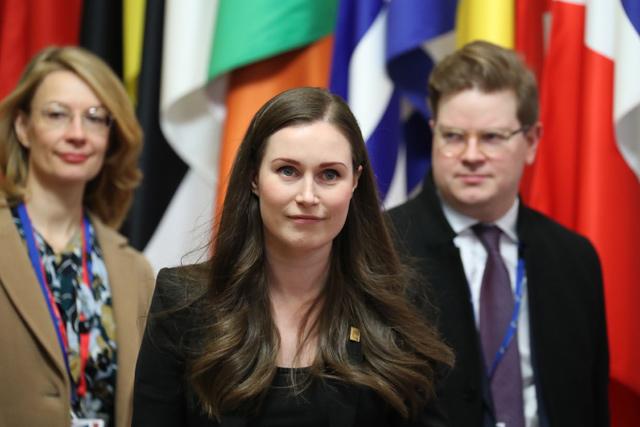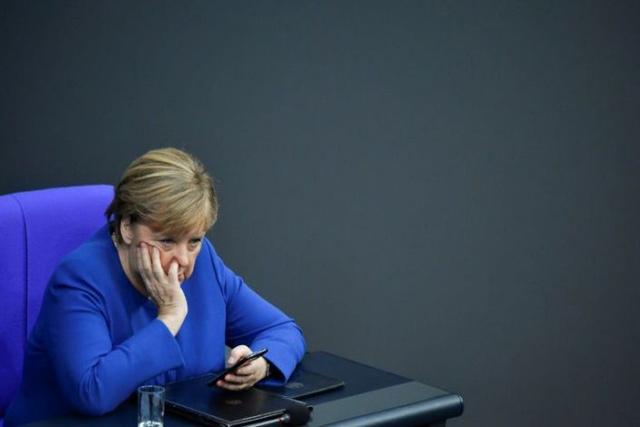You are here
EU budget summit ends with no deal
By AFP - Feb 22,2020 - Last updated at Feb 22,2020

Finland’s Prime Minister Sanna Marin leaves at the end of the special European Council summit in Brussels on Thursday (AFP photo)
BRUSSELS — An EU summit called to set the bloc’s next seven-year budget ended in impasse late Friday, riven by competing groups among the 27 member states and pressure to fill a funding gap left by Brexit.
Differences were “still too great to reach an agreement,” German Chancellor Angela Merkel told reporters at the end of the two days of talks in Brussels.
No date had yet been set for another summit to try again, but Merkel added that “we are going to have to return to the subject”.
The trillion-euro-plus budget, the multiannual financial framework, is meant to be operational from next year and run to the end of 2027.
But the summit revealed stubborn differences between a handful of wealthy “frugal” states and a larger group wanting more money to meet both big European ambitions and to fill the 75-billion-euro shortfall left by Britain’s exit from the EU last month.
“Unfortunately we have observed it was not possible to reach an agreement, we observed we need more time,” said European Council President Charles Michel, who had called the extraordinary summit and stewarded the talks.
He said, however, he was right to make the effort: “As my grandmother said, to succeed you first have to try.”
‘Goup vs group’
European Commission President Ursula von der Leyen, who is counting on a big enough budget to meet her executive’s “geopolitical” ambitions, said the EU discord was sign of “democracy”.
Despite Merkel and French President Emmanuel Macron teaming up to back Michel in his search for an acceptable compromise, two groups of countries dug in their heels.
One was the so-called “frugal four” made up of Austria, Denmark, The Netherlands and Sweden, which wanted the budget reined in to reflect the UK’s absence and to avoid them having to shoulder a bigger budgetary burden.
The other was the “friends of cohesion”, 16 member states including Italy, Spain, Portugal, Greece, Poland and Hungary that want to ringfence EU spending on things like infrastructure as well as farm subsidies.
“We ended up in a situation of group versus group. That’s why it failed,” a source close to the negotiations told AFP.
Germany and France stood apart from those groups but had their own interests to defend.
Merkel is determined to retain a budget rebate her country has received ever since Britain wrangled one for itself while a member. Macron, who is against the rebates, is resolute that the farm subsides — from the Common Agricultural Policy (CAP) — not be cut.
“The CAP cannot go to pay for Brexit,” Macron said as the summit broke up. The French president was to visit a national farm show in Paris on Saturday.
He has sought to push the EU to be more united and more ambitious and insisted on Thursday that Britain’s departure should not clip the bloc’s wings.
A battle over percentages
Much of the summit’s haggling focused on how much of a percentage of gross domestic product (GDP) the member states would have to cough up.
The “frugals” were entrenched at paying no more than 1 per cent.
Dutch Prime Minister Mark Rutte said that position was “reasonable”, addressing inflation and economic growth.
But, he said, the hole left by Brexit “is now a fact has to be reflected in the budget”.
Italian Prime Minister Giuseppe Conte said his rival group was working on “counterproposition” with a vision of a “more ambitious” European Union that would require a higher GDP target.
Macron expressed frustration with the situation, saying “I don’t think it’s a good method, to try to break away in groups and to block things, to get together and form types of blocking coalitions”.
Michel’s revised proposal made on Friday was for 1.07 per cent, which would have resulted in a seven-year budget of 1.09 trillion euros.
That would be just a bit above the previous one of 1.08 trillion euros while covering the Brexit hole. But it found no takers.
Far above the figures thrown around at the summit is the one proposed by the European Parliament, pressing for 1.3 per cent of GDP.
That would be to cover Brexit, fund all current programmes and go to ambitious new ones such as fighting climate change, increasing EU investment in space and technology, and boosting the bloc’s external borders.
Almost all leaders at the summit view the MEPs’ ask as way too much. But they are also aware that the parliament has to give its assent to a budget deal among member states, whenever that might be worked out.
Related Articles
BRUSSELS — EU leaders gathered on Thursday for a stormy summit to decide the bloc’s seven-year budget, with bitter divisions between parsimo
BRUSSELS — When Britain leaves the European Union at midnight on Friday the bloc loses the second-biggest net contributor to its budget, lea
BRUSSELS — An EU summit to agree a huge coronavirus economic rescue package was at risk of collapse without a deal on Sunday as bickering le
















